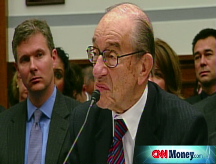Wall Street starts with a thud
Dow down 400 points as U.S. joins global market swoon on recession fears.
NEW YORK�(CNNMoney.com) -- U.S. stocks joined a worldwide selloff at Friday's open, with the Dow down about 400 points, as a wave of anxiety about a global recession sent investors heading for the exits.
The Dow Jones industrial average (INDU) fell 4.5%. The Standard & Poor's 500 (SPX) index tumbled 5.2% and the Nasdaq composite (COMP) lost 5.3%.
Stocks followed the lead of plunging markets worldwide, with Japan's Nikkei index ending down 9.6%. European markets down almost as sharply, with major indexes down 8% in France and Germany and 7% in London.
Markets were down 14% in Moscow when the exchange there suspended trading until Tuesday.
"Today might be the day where everybody throws in the towel," said Peter Cardillo, chief market economist for Avalon Partners. "People are saying 'I've had it, I can't take it anymore, I'm selling everything.'"
Markets were so jittery early Friday that the New York Stock Exchange felt it was necessary to post a statement on its blog confirming that trading would open as normal at 9:30 a.m. ET, saying it felt it was necessary to answer widespread rumors that the open would be delayed.
The NYSE also posted updated details of so-called circuit breakers, which would halt trading for certain periods of time if the Dow Jones industrial average falls 1,100 points during the trading day. It said it was posting that information with "the fervent hope we won't need them."
Futures trading limits were imposed before 7 a.m. ET, when Dow Jones industrial average futures were down 548 points. The futures for the S&P 500 were down 60 and Nasdaq 100 futures were down 84. Futures measure current index values against the perceived future performance and can indicate how markets open when trading begins in New York.
Economists said that even commodities were selling off, including a $18 drop in gold and a 6% decline in copper, with oil trading below $65 a barrel. The dollar rose against the euro and the British pound, but plunged against the yen.
"It's across-the-board global liquidation of stocks," said Art Hogan, chief market strategist at Jefferies & Co.
Hogan cited a 0.5% drop in the United Kingdom's third-quarter GDP as one key reason for the selloff. That drop was from the previous quarter's level of economic activity, making it much more severe than the typical measure of U.S GDP, which is reported as an annual rate of growth or decline.
A 0.5% quarter-to-quarter decline works out to nearly roughly a 2% drop in annual GDP.
Andrew Sentance, a member of the Bank of England, told the BBC early Friday that the chance of a severe recession there had increased, and that the central bank would have to adjust interest rates according.
Expectations that the Bank of England and European Central Bank would have to make sharp cuts in interest rates in the weeks and months ahead sent the pound and euro plunging versus the dollar in early trading.
The yen was the strongest of the major currencies, as the Bank of Japan's rate is already down to 0.5% and thus it has little room for additional cuts.
The gloom followed a positive Thursday for Wall Street. The Dow and S&P 500 both advanced while the Nasdaq slipped. But trading has been volatile lately amid uncertainty about how deep the economic crisis will be and how long it will last.
Stocks to watch Friday included software giant Microsoft (MSFT, Fortune 500), which reported solid quarterly results late Thursday but issued a cautious outlook.
Oil. The Organization of Petroleum Producing Countries, which controls 40% of the world's oil supply, announced Friday that it would cut production by 1.5 million barrels a day, from its current level of 29 million.
OPEC had intended to raise prices by reducing production. But after the announcement, oil prices dropped $3.60 a barrel to $64.20 in electronic trading.
Housing market. At 10 a.m. ET, the National Association of Realtors will announce the September tally for existing home sales, an important measure in the real estate market. A consensus of estimates from Briefing.com projects an annual sales rate of 4.95 million units, up from last month's figure of 4.91 million. ![]()


